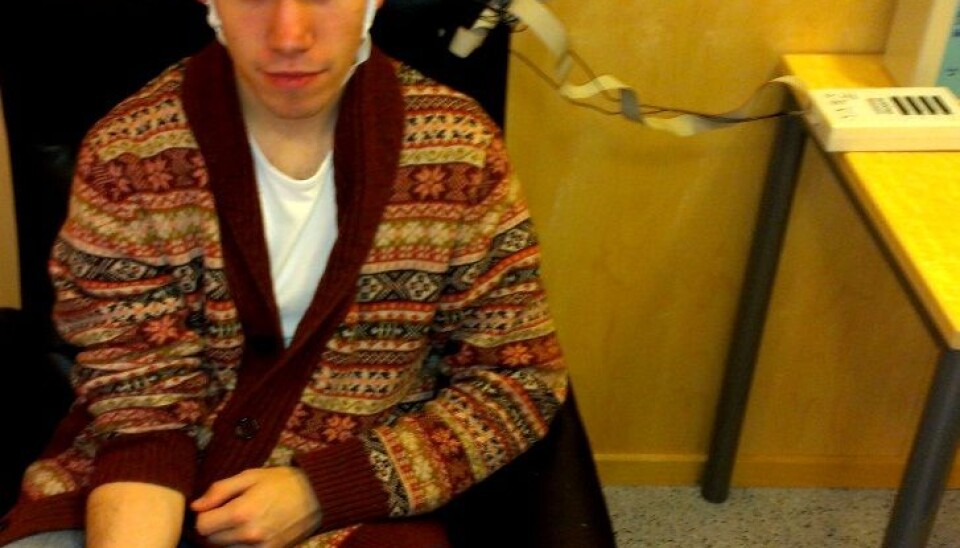
Fear cancels out placebo effect
Placebos offer no analgesic effect for people who are afraid of pain, a Norwegian study shows.
Denne artikkelen er over ti år gammel og kan inneholde utdatert informasjon.
Our bodies have a remarkable ability to be influenced by placebo medicines.
When given fake pills, we can rid ourselves of afflictions or contract them, depending on what we think the fake medicine is capable of.
People differ, however, and not everyone is positively influenced by pills with no real active medicinal ingredients.
This phenomenon perked the interest of Peter Solvoll Lyby, a psychologist who then decided to study why some people aren’t affected by placebos.

“The people who received no placebo relief in pain tests had a tendency to experience more fear and anxiety about the pain,” says Lyby, who recently delivered his PhD dissertation on pain and the placebo effect at the University of Tromsø.
“When you tell a person that he or she is getting a pain-killing pill, you create the expectation of pain relief, and pain is reduced,” says the psychologist.
The ability to think pain away might sound like hocus pocus, but there’s a logical explanation.
Power of the mind
“We have a pain-relieving system in our bodies that is switched on when we skin a knee, for example. The injury causes our bodies release opioids to the brain,” explains Lyby.
Opioids are similar to morphine and have an analgesic effect.
“The instant we injure ourselves it’s very painful, but the sensation is reduced when the analgesic is switched on,” he says.
We can also release these opioids when we haven’t been hurt.
Lyby says this is exactly what happens when we are told that a medicine we’ve taken will ease our pain.
But if we are frightened, our bodies react in a different way. A substance is released that hinders opioids from doing their job.
Numb with fear
“If fear is experienced as very intense it can curb pain, but a low to moderate amount of fear has been shown to increase pain,” says Lyby.
If we are threatened or in grave danger and need to flee quickly, we might not feel pain from an injury until we reach safety. But if we are a little less scared our fear can intensify our pain.
“Increased fear is linked to the release of a substance in the brain called CCK. This substance has two effects; it increases pain and it blocks opioids,” says the psychologist.
Lyby demonstrated in his study that fear counteracts the placebo effect with regard to pain.
“This happens because two opposing effects occur simultaneously,” he explains.
Compounding the negatives
The psychologist says these two opposing forces essentially double the negative effects for frightened patients.
“Lots of patients experience fear and anxiety, and that can weaken the placebo effect”
Physicians and the pharmaceutical industry know that to a certain extent, patients’ bodies initiate their own pain relief when given treatment.
“The placebo effect supplements the effect of standard treatment with medication. It can readily take effect before the medicine has actually started to work, but in a different way,” explains the psychologist.
However, the effect can be cancelled out if you are frightened. Lyby says that the effect of real medications prescribed by a doctor can also be undermined by fear.
Medicines as opioids
This happens because some painkilling medicines are based on opioids, and the CCK substance that is released when we are frightened can block them.
“Total pain relief can thus be reduced,” he says.
Lyby stresses that he has only studied painkilling medications, and cannot say whether fear can have an effect on other medicines.
Most people are aware of the positive placebo effect, but there is a corresponding harmful reaction from expectations called a nocebo effect. Among particularly anxious patients, it can muddle things even more and add a third negative to this witches’ brew.
“Anxiety can give a medicine a nocebo effect if you scrutinize the list of possible side-effects,” Lyby says.
“The media can also have an effect when they hype the threat of diseases or medical problems, making the public anxious or doubtful,” he says.
Suffering for research
Lyby and his research colleagues subjected more than 100 study subjects to a different amounts of pain. Specifically, test subjects were exposed to pain caused by heat from a so-called thermode strapped to their arms.
The study participants were divided into three groups, each of which were given varying amounts of pain for variable amounts of time. They were given a placebo medicine and told it had a beneficial pain-relieving effect.
They also had electrodes on their heads so the scientists could measure their brainwaves.
“We can see the response to pain the we’ve caused as a brainwave and thus can see if the placebo pills reduced the wave shape,” explains Lyby.
Threatened with shocks
The study subjects had to fill out a questionnaire that asked them to quantify how much they fear pain.
“In people who were greatly afraid of pain, we saw no change in the wave shape. In other words, the placebo pill had no effect,” says Lyby.
In the last part of the study, the researchers wanted to induce the maximum amount of fear possible in their test subjects, and threatened them with electric shock.
“We connected electrodes to their fingertips and told them that within the next seven to ten minutes they would get an electric shock,” says the psychologist.
Nothing was said, however, about when the shock would come or how much it would hurt.
As a result the placebo effect was also completely cancelled out among these test subjects.
Doesn’t recommend placebos
Lyby writes in his PhD thesis that the placebo effect has been proved to help in depression, anxiety, Parkinson’s disease, asthma and pain.
He adds that this has led to discussions in the medical profession as to whether or not placebos should be used more often in treatment.
Lyby believes, however, that more studies of the placebo and nocebo effects need to be conducted before the use of fake medicines can be considered.
“It would be unconscionable to implement a form of treatment that we don’t know enough about, and to dupe patients into thinking they are getting real medications when actually they’re getting inactive substances.”
----------------------------
Read a version of this article in Norwegian at forskning.no
Translated by: Glenn Ostling
































